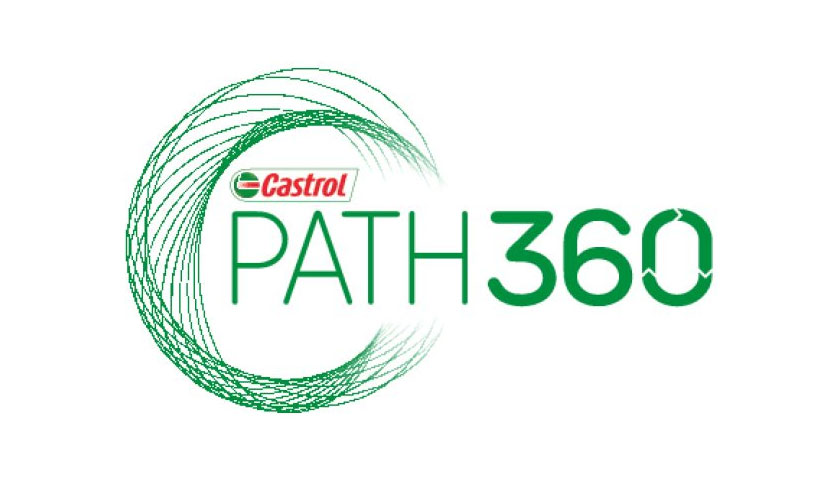To achieve the Paris climate goals, the world will need improvements in end use energy efficiency. In one estimate these improvements can provide almost 40% of greenhouse gas (GHG) emissions reductions requiredi. Today, around a quarter of the world’s energy is lost to friction, corrosion and wear.ii
Ever since Castrol was born, it has been dedicated to delivering products that help save energy by fighting friction, reducing corrosion and minimising wear; delivering high-performance with increased efficiency.
Castrol’s new PATH360 strategy:
- Embraces circular thinking – looking at the life-cycle of Castrol’s existing and new products, to see how they can be improved, extended, reused or recycled.
- Supports new and growing sectors, like renewable energy and e-mobility with products and services.
Castrol PATH360’s three focus areas and 2030 aims are:
- Saving waste – continuing to help customers save energy, waste and commercial customers’ water as well as halving Castrol’s plastic footprintiii.
- Reducing carbon – Castrol aims to halve the net carbon intensity per litre of its productsiv.
- Working to improve people’s lives around the world, including through carbon neutral programmes and other activitiesv.
Reducing life-cycle carbon
To develop the PATH360 strategy, in 2020 Castrol conducted its first assessment of its greenhouse gas inventory in line with the GHG Protocol covering scopes 1, 2 and 3. Castrol has identified key enablers for improvement and carbon reduction across its products’ life-cycles.
Castrol aims to deliver high performance with lower life-cycle carbon by improving operational efficiency and exploring opportunities to transition to renewable energy. Castrol is also working with its suppliers, sourcing lower carbon raw materials, reducing packaging and working with its partners to influence what happens to products after customer use.
For example;
- Three of Castrol’s plants moved to renewable electricity in 2020.
- Castrol’s new light-weight bottle design uses less plastic, which will save 7,000 tonnes per year by 2023 and is optimised for distribution.
- Castrol has started optimising formulations to deliver lower life-cycle carbon.
“Our approach is 360-degree, holistic, whole-system thinking. We’re not starting from scratch with PATH360, it builds upon work we’ve been doing for years, pulling it all together into one integrated sustainability programme. “
Mandhir Singh, senior vice president, Castrol
Carbon neutral
In 2014, Castrol became the first brand in the world to offer a certified carbon neutral lubricant, Castrol PROFESSIONAL, in accordance with PAS2060vii. Ever since, Castrol has continued to expand its carbon neutral offer across cars, commercial vehicles and wind turbines.
Under Castrol’s PATH360 sustainability strategy, Castrol plans to increase its carbon neutral offer, including a lead brand across each of the automotive, industrial, marine and energy sectorsviii, as well as all products sold by Castrol in Australia, New Zealand, and Vietnamix in 2021x.
To fulfil its carbon neutral programme, Castrol buys carbon credits from bp Target Neutral which supports and contributes to a portfolio of carbon reduction, avoidance and removal projects around the world. These projects have additional benefits that support the UN Sustainable Development Goals, improving the lives of millions of peoplexi through better health, decent work, training and gender equality.
Castrol’s senior vice president, Mandhir Singh, said:
“Our approach is 360-degree, holistic, whole-system thinking. We’re not starting from scratch with PATH360, it builds upon work we’ve been doing for years, pulling it all together into one integrated sustainability programme. We know that many of our customers are looking for more sustainable offers and help with their sustainability goals, and this is what this programme is designed to deliver.”
More widely than Castrol, bp has set out a series of greenhouse gas emission reduction aims for 2030 in support of its ambition to be a net zero company by 2050 or sooner and to help the world get to net zero. bp does not intend to rely on offsets to meet these 2030 aims.
